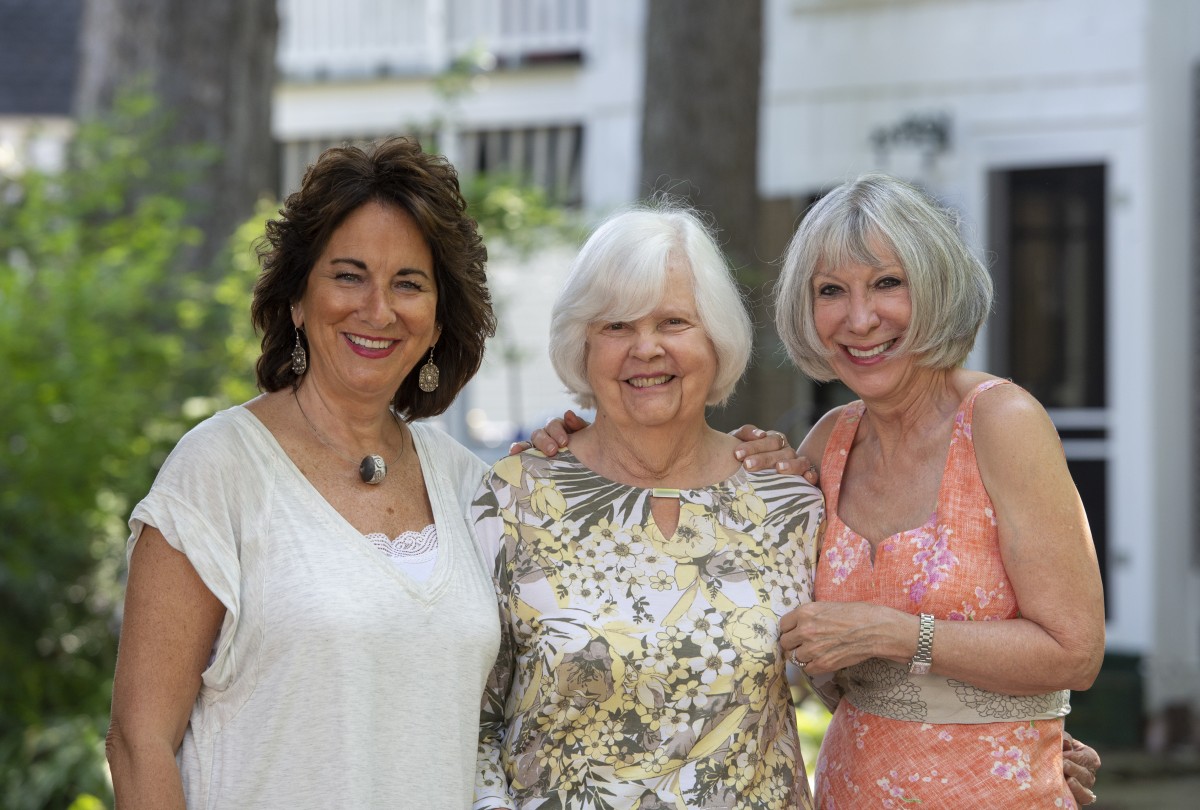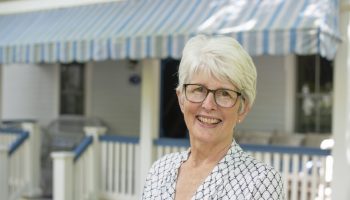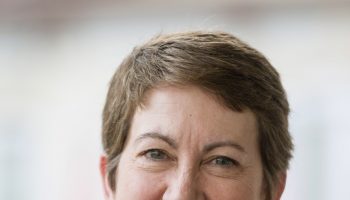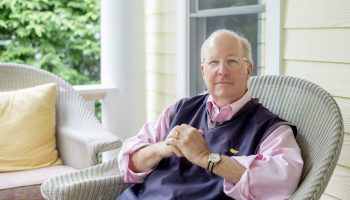Friendship is central to the idea of Chautauqua. How many of our friends and acquaintances can we count who first discovered the Institution as guests of other friends of theirs, or indeed, of us? And how often do we witness the revival of friendships born of common experiences at Boys’ and Girls’ Club, sometimes after decades, to blossom again as retirement beckons? Certainly, many families come to experience and cherish Chautauqua because there is a family house here on the grounds, but friendship is a key draw for new Chautauquans, and an essential glue for the relationships to others and to the Institution that endure.
Three women — from different backgrounds, born in different eras, at different and dissimilar points in the arcs of their lives and careers — have formed a durable, cherished bond around their common attachment to Chautauqua. They are Pat Bell, a retired airline flight attendant and homemaker; Cheryl Gorelick, a retired international security policy analyst for the U.S. Department of Defense; and Debra Dinnocenzo, a mostly retired human resources executive and consultant. This is their story.
Could you each introduce yourselves briefly?
Pat: I’m Pat Bell. I grew up in Ohio. I’ve been coming to Chautauqua for about 45 years. I first came when I was 15, and my mother was working for a cafeteria that just opened. The owners were from Buffalo, and they thought that when they opened the cafeteria, everybody would flock to dine with them. There were a lot of restaurants in Chautauqua at that time, and everyone went to places they already knew well. Not many came to our cafeteria. In mid-season, the cafeteria closed, and I found a job sweeping up at a beauty parlor then located in the Athenaeum Hotel.
I didn’t return until after college, when my mother resumed working on the grounds. My brother eventually bought a house here, and we began a tradition of celebrating my mother’s July 4 birthday at Chautauqua. I worked after college as an airline stewardess, but in those days you had to quit when you got married, so I did when I did. I taught elementary school for four years. My first husband worked for DuPont, and when we finally moved to company headquarters in Wilmington, Delaware, he said he might not come to Chautauqua in the summer. His job was too busy, he said. Then, after one summer alone, he changed his mind and joined me and our three kids. He died when he was 46, and I continued to bring my children to the grounds.
After 15 years, I remarried and my second husband would tell people, “I not only got Pat, but I got Chautauqua, too.” After he passed, I have been coming from my home in Texas for periods ranging from a couple of weeks to the whole season. Chautauqua has held a unique place in my heart. It is a place like no other.
Debra: I’m Debra Dinnocenzo. My husband I and came here at the invitation of friends about 15 years ago. We and our friends are from Pittsburgh, and our children went to school together. We liked Chautauqua, liked the idea of it and began to visit. We bought our present cottage in 2005. My husband is a fourth-generation Chautauquan whose grandparents actually met here. We checked, and the Daily in those days, nearly 100 years ago, actually announced the arrival of his grandmother, by steamer, on Chautauqua Lake. But (my husband) hadn’t personally been on the grounds before we visited our friends 13 years ago. I had no previous Chautauqua history at all, though I had certainly heard about it.
I have been able to run my business remotely from our cottage in Chautauqua during the summer season, so that has definitely made it easier to spend extended time here.
Cheryl: I’m Cheryl Gorelick, and I grew up in the area, in Dunkirk. I knew about Chautauqua. I would come on Sundays sometimes with my mother, my aunt and a girlfriend. It was just an outing. So I moved to Washington, D.C., to pursue my career, and over the years, my husband and I would come up to this area to visit my family. We would try cross-country skiing here when visiting for Christmas and gradually began coming for a lecture during the season. We would stay for a couple of days at the Athenaeum Hotel. We were looking for a community, and especially looking for an intellectually based community.
After a while, we thought maybe we should think about buying a place. We looked around, didn’t see anything we loved, and wound up buying a lot in the Garden District. We stayed for longer periods, and then built a house on our lot. The Garden District was new, and it sometimes seemed like the construction rules changed on us a couple of times. I guess it was like giving birth. I wouldn’t necessarily want to go through it all again, but I do love the house, so it was all well worth it. I did lose my husband, but he was able to see our house completed, and I’m grateful for that.
How did you all meet?
Cheryl: Well, Institution President Tom Becker used to invite new property owners to a soiree at his residence on the grounds. We got name tags, and we introduced ourselves to each other. We all sat on a sofa.
This was in 2005?
Debra: It might have been 2006.
Cheryl: I mentioned that we were looking for a community. In my work at the Defense Department, I worked basically with all men. I wanted to meet women who might not be in my age range but with whom I might have a real intellectual connection.
Debra: I remember that the new property owner reception concluded, but we weren’t done. So we arranged to meet the following week. We have been meeting for lunch and for other reasons every season since then. We have been moving around in the area for our luncheons.
Pat: Somehow we all met and liked each other. Everything happens for a reason. When it was time to leave that reception, I thought, “Darn, I haven’t gotten to know these interesting women well enough yet.” I wanted more. Getting together was just so much fun. We never stopped.
Debra: We did a field trip to Lily Dale one year.
Cheryl: Yes, I was in a particularly spiritual state that summer, as I recall.
Did your readings there reveal previously unrecognized common elements between the three of you?
All: Not really.
Debra: I would say we all come from different spiritual backgrounds, but we did all enjoy that experience at Lily Dale. Much of the pleasure of it might have come just from being together.
What is the glue that keeps the three of you together?
Pat: I think it’s pretty simple. We really like each other. As we have mentioned, we come from very different backgrounds. Even here, we have different agendas. Cheryl is busy with the Chautauqua Women’s Club, Friends of the Theater, the Opera Guild. Debra is still busy with her business and the Chautauqua Literary and Scientific Circle Class of 2010. I am much quieter. I go to the lectures, I go to the Presbyterian House. I’m busy with family. We love and trust each other.
Debra: I think we can just talk about anything with each other. No subject is off limits.
Cheryl: I’ve been thinking. There are some common elements between us. Pat, you and I both lost husbands, for example. Debra and I love to do the Beach Boys together. We’re kids again when they come to the Amp. They should want to meet us.
Well, the Beach Boys played part of the soundtrack of your lives.
Cheryl: We don’t want to go there.
Debra: We can talk spirituality, love and lust. I don’t care what Pat’s age is, she’s right there with us.
Have there been years when it looked like circumstances would threaten your ability to get together?
Debra: Cheryl’s schedule. I have to travel for business. So yes, it’s been difficult at times. But Thursday lunch was usually a reliable time. We all tried to keep that free for each other.
Cheryl: Pat had some family issues sometimes in Texas. We would send her flowers and stay in touch.
Debra: We don’t really see each other in the off-season. We have talked about it, but it hasn’t happened. We would like to go somewhere together for a week. We do try to at least stay in touch during the winter.
Cheryl: It occurs to me that since we have different lives here, we don’t spend our time gossiping about Chautauqua. It’s about us as individuals and as a trio of real friends. Our conversations are more intimate,
more interesting.
How is Chautauqua as a physical setting for your friendship? Does this place add any element to it?
Pat: I think we all care about Chautauqua, probably in different ways. Debra is the activist; she cares in her own way. Cheryl is into everything. She throws herself into every club and activity that she is interested in. I have been here a long time, so I care about Chautauqua’s history. My kids and grandchildren all went through Club, so history is especially meaningful to me.
Cheryl: Where else would you find a community that managed to be of interest to each and all of us?
Debra: I think Chautauqua conjures up a lot of introspection. It affords a space to step back from your everyday life. We have managed to leverage that in the way that we share ourselves with each other.
Do you involve family in your get-togethers, or is it mostly just the three of you?
Debra: It’s usually just us. We kind of create our own entity that is kind of separate from our families. We don’t try to exclude anyone, but it usually just winds up being us. But we don’t go out of our way to involve each other in family gatherings.
Pat: The exception was at our first meeting. My son was there, and I think you all remember meeting him.
Cheryl: Yes, and your daughter-in-law, Pat. I think I got her involved in some of my activities. You know, talking this way reminds me for some reason of time I spent on Canandaigua Lake as a kid in the summer. I used to row my boat to stump meetings on the weekend. There wasn’t too much to do there on a Sunday.
Is one of you usually the organizer for getting together?
Debra: I might be the one that tries to keep us on some kind of schedule so we don’t miss a chance to meet, but we have all done that at times.
You don’t get together to discuss a book you have all read. You don’t play cards. You don’t plan a potluck meal.
Cheryl: No, that’s right. We don’t do that. And it’s so nice, and kind of unusual, not to have to worry about any of that. There’s no agenda, and no sport like sailing or anything like that to build around. Given that we have such different pursuits here, I am not sure we’d have ever really gotten together if we hadn’t met coincidentally that evening at the President’s Cottage.
Pat: We’re very different people. Different backgrounds.
Was there ever a real emotional crisis for one of you while you were all at Chautauqua?
Cheryl: When my husband died, I came up to Chautauqua not too long after. I didn’t really know how it would feel. I didn’t know how I would feel. Pat was very helpful. She had gone through that. And Debra and I talked a lot about how it would be for me now as a single person at Chautauqua, after sharing so much of it with my husband. How you define yourself here as a single person after the death of a spouse is a big deal. It’s not easy to deal with.
How about a crisis in the off-season? Would you reach out as readily to each other?
Cheryl: That’s easy for me. Absolutely. Yes.
Pat: Yes, for sure.
Debra: That goes for me, too.
Pat: After my second husband died, it was about two years before I met these two. My blood pressure was going up and down. I worked with a grief therapist for a couple of years. I guess I was ready to welcome new people into my life.
Pat, it sounds like you would view sharing trauma with Cheryl and Debra as a burden to them.
Pat: Yes, probably. I would instinctively not want to dump it on them.
And Cheryl would instinctively share things?
Cheryl: Yes. I mean, after my husband died, I processed on my own, but afterward, yes, I reached out.
So from a coincidental meeting, a strong friendship has endured.
Debra: Yes. We say that we could have met anywhere. But the fact that we met at Chautauqua, and there is such space for us individually and as a group of three friends here, that has made it easier and richer, for sure.





